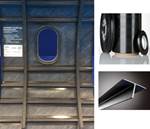Queen’s University Belfast presents research in thermoplastic drilling performance optimization
Researchers have published findings from a multi-objective optimization study on carbon fiber-reinforced PEKK drilling in an effort to better understand the material for use in aviation fastenings.
Researchers from the School of Mechanical and Aerospace Engineering at Queen’s University Belfast (Northern, Ireland) have reported significant advancement in optimizing the drilling performance of carbon fiber-reinforced polyetherketoneketone (CF/PEKK), a thermoplastic composite attracting growing interest in the aviation industry for its toughness, reparability and recyclability.
Mechanical fastening through riveting remains a critical process, particularly for load-bearing components and joints composed of dissimilar materials like metals and composites. Drilling of composite materials often results in damage, such as delamination under improper or suboptimal conditions, contributing to as much as 60% part rejection during aircraft assembly. While traditional research has largely focused on drilling thermoset carbon fiber-reinforced epoxy (CF/epoxy), little is known about the performance of novel thermoplastics like CF/PEKK.
Addressing this gap, the Queen’s research team has conducted what is contended to be the first multi-objective optimization study on CF/PEKK drilling. Their work targets minimizing hole damage and improving production efficiency, employing a hybrid optimization algorithm that integrates Non-dominated Sorting Genetic Algorithm-II (NSGA-II) and Techniques for Order of Preference by Similarity to Ideal Solution (TOPSIS). The study also incorporated in situ temperature monitoring using an infrared thermal camera, successfully minimizing drilling damage within tolerance levels as per industrial standards.
The team assessed CF/PEKK’s drilling performance alongside traditional CF/epoxy. The results revealed that CF/PEKK requires markedly different drilling parameters than CF/epoxy, owing to its thermoplastic nature and thermal and mechanical behavior during machining.
Dr. Dan Sun and Dr. Jia Ge, who led the research, state: “Our findings underscore the distinct properties of CF/PEKK and emphasize the need for specialized optimization strategies. This research represents a significant step forward in harnessing the full potential of thermoplastic composites in high-performance sectors like aerospace.”
For more information and to access the full report, visit this link.
Related Content
-
CFRP planing head: 50% less mass, 1.5 times faster rotation
Novel, modular design minimizes weight for high-precision cutting tools with faster production speeds.
-
Plant tour: Joby Aviation, Marina, Calif., U.S.
As the advanced air mobility market begins to take shape, market leader Joby Aviation works to industrialize composites manufacturing for its first-generation, composites-intensive, all-electric air taxi.
-
Optimizing machining for composites: Tool designs, processes and Industry 4.0 systems
Hufschmied moves beyond optimized milling and drilling tools to develop SonicShark inline quality control system and Cutting Edge World cloud platform for optimized tool use and processes.

















